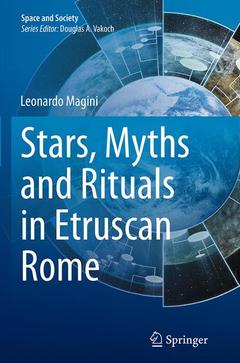Description
Stars, Myths and Rituals in Etruscan Rome, Softcover reprint of the original 1st ed. 2015
Space and Society Series
Author: Magini Leonardo
Language: English
Subjects for Stars, Myths and Rituals in Etruscan Rome:
Stars, Myths and Rituals in Etruscan Rome
Publication date: 08-2016
Support: Print on demand
Publication date: 08-2016
Support: Print on demand
Stars and rituals in Etruscan Rome
Publication date: 12-2014
181 p. · 15.5x23.5 cm · Hardback
Publication date: 12-2014
181 p. · 15.5x23.5 cm · Hardback
Description
/li>Contents
/li>Comment
/li>
This book offers a detailed and fascinating picture of the astonishing astronomical knowledge on which the Roman calendar, traditionally attributed to the king Numa Pompilius (reign 715-673 B.C.), was based. This knowledge, of Mesopotamian origins, related mainly to the planetary movements and to the occurrence of eclipses in the solar system. The author explains the Numan year and cycle and illustrates clearly how astronomical phenomena exerted a powerful influence over both public and private life. A series of concise chapters examine the dates of the Roman festivals, describe the related rites and myths and place the festivals in relation to the planetary movements and astronomical events. Special reference is made to the movements of the moon and Venus, their relation to the language of myth, and the particular significance that Venus was considered to have for female fertility. The book clearly demonstrates the depth of astronomical knowledge reflected in the Roman religious calendar and the designated festive days. It will appeal both to learned connoisseurs and to amateurs with a particular interest in the subject.
From the Contents: The Beginning of Astronomical Time and the Feriae Martis.- The Numan Year, the Romulean Year and the Feriale antiquissimum.- The Names of Etruscan and Roman Months.- The Numan Cycle.- The Numan Year and Cycle, and the Motion of the Moon.- The Numan Cycle and the Movements of the Sun, the Moon and Venus.- The Solar New Year on March 8 or 9.- The Movements of the Moon and Venus and the Language of Myth.
Presents Roman astronomical science, perhaps the most important advance in the history of ancient astronomy Clearly demonstrates how the ancient Roman calendar was dependent on highly developed astronomical knowledge Explains the relation of planetary movements and astronomical events to Roman festivals and myths Includes supplementary material: sn.pub/extras
© 2024 LAVOISIER S.A.S.




